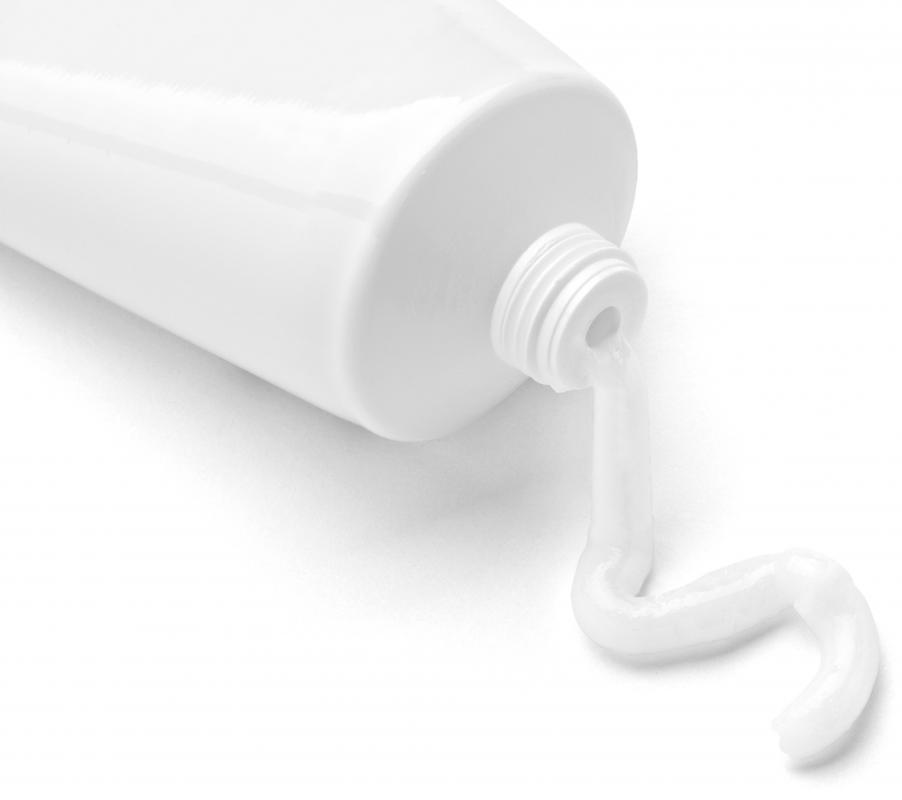At TheHealthBoard, we're committed to delivering accurate, trustworthy information. Our expert-authored content is rigorously fact-checked and sourced from credible authorities. Discover how we uphold the highest standards in providing you with reliable knowledge.
What is a Penis Lesion?
A penis lesion is any sort of wound, ulcer, or spot that appears on the penis. Most will look somewhat red or scaly, and they may also cause pain or itching. There are a number of reasons why men and boys develop lesions on this part of their body, but sexually transmitted diseases (STDs) are some of the most common. Certain skin conditions like eczema and psoriasis may also be to blame, and in rarer cases lesions may be a sign of some cancers. Over-the-counter creams and medications can sometimes give temporary relief, but medical experts generally recommend that anyone who is concerned about a lesion on or around the penis get a professional opinion. This is particularly important for men whose wounds don’t seem to be getting better with at-home treatments, or any time the spots seem to be spreading to other parts of the body. Depending on the cause, things could get worse before they get better, and the condition could be contagious to others, too.
Identifying Lesions

There are a couple of different ways in which penis lesions appear on the skin, and a lot of this has to do with the specific cause. In some cases, they may start out as small “craters” on the surface of the penis or testicles that scab over with time. They may also look like raised lumps, almost like pimples, or they may have a widened, flat top. In other instances they could look like a flat rash that is spread out over all or part of the sex organ.

Sometimes they itch, sometimes they burn, and sometimes they ache; they could also cause almost no outward sensation. Again a lot depends on the cause. Lesions caused by bacterial and viral diseases tend to spike during breakouts but go all or mostly all away during periods of remission. When the spots come as a consequence of skin dryness or an otherwise more or less constant condition, though, they’re more likely to persist and even get worse as irritation increases.
As a Symptom of Sexually Transmitted Diseases

At least among sexually active men, STDs are one of the biggest causes of lesions in the genital region. Syphilis is one of the most commonly affiliated with outward wounds and scabbing. The first symptom in these cases is usually a round ulcer on either the penis itself or somewhere on the scrotum. It isn’t usually painful and will go away on its own, but in nearly all cases this is only a temporary absence; usually within a few days the lesions will return as a number of painless ulcers that are gray in color. They do not typically cause any pain, but the man who notices either type of lesion should usually see a doctor within a few days. The condition is contagious and the man and his sexual partners should both be treated with antibiotics to prevent a bigger and more troubling infection. When left wholly untreated, syphilis can lead to death.

Genital warts may also be to blame. These are usually caused by the human papillomavirus, and they produce small raised bumps that are similar in appearance to warts that occur on other parts of the body. Infected men may see a single wart on the penis or there may be numerous outbreaks that are pink, brown, or the same color as the surrounding skin. The surface of this type of penis lesion is usually moist. Once the genital warts have been diagnosed, they can be removed by a doctor or killed off with certain creams and topical applications.
Causes Linked to Skin Conditions

Skin conditions like psoriasis and eczema can also cause lesions, though usually only in extreme cases and usually only when the condition has gone unchecked for some time. Psoriasis looks like red, scaly spots that are most commonly found on either the glans or the foreskin of the penis. A doctor may recommend a topical cream containing steroids to treat this condition.
Eczema also has a red, scaly appearance, but this type of lesion can be very itchy and uncomfortable. Steroid creams can also be used to treat this, as can thick moisturizing creams. In both cases, looking for environmental triggers, whether it be skin irritants like detergents or dietary allergies or sensitivities, can be a good way to reduce flare-ups. Neither psoriasis nor eczema is infectious, but both can be very uncomfortable and can affect the sufferer’s quality of life.
Getting Help
Medical professionals usually recommend that anyone with a penis lesion get a full medical check-up to rule out serious conditions, as well as to figure out the most effective treatment plan. It’s usually considered rare, but certain cancers have been first diagnosed by skin lesions on the penis — and in these cases more than many others, prompt treatment can make a huge difference in the outcome. Even if there isn’t anything truly serious going on, getting a professional opinion can bring peace of mind and relief, and can also reduce the risk that infections or diseases could pass on to others.
AS FEATURED ON:
AS FEATURED ON:















Discussion Comments
My husband went to the doctor and came back and told me his problem was that he had something called Peyronie's Disease, which that was the information he brought back with him but when I got the bill and the job from the insurance company they was a lab charge that was done and was not paid. So since I do that care of the bills, I pulled his receipt out from the doctor to get the visit code and it also had Penile Lesion on the receipt, but never once said anything to me about it. My question is should I be worried?
I had one, went to a doctor and got treatment. Two months later, it was all gone. I'm doing to the doctor in three days for a final check.
My advice: visit a doctor of your gender, tell him what's wrong and he will do the rest.
Having a penis lesion is no laughing matter, whether it hurts or not. Painless lesions can actually come from some serious diseases and disorders. It might be a little embarrassing to present your doctor with your privates, but if it means keeping your whole body healthy it is worth it!
After all, doctors aren’t going to judge you or laugh at you. Or, at least they shouldn’t. If they do, find another doctor as soon as possible to evaluate your problem.
Am I right to think that if you suspect you have a penis lesion of any kind that it is best to go to the doctor and have it looked at? It seems like an awfully sensitive place to take a chance on. I mean, it’s not exactly like getting a spot of dry skin on your arm. It could be herpes or something worse.
But, I understand that it may be difficult for some people to go to the doctor with the cost of health care these days. They, too, have options with clinics and such funded by the government. Don’t take a chance on something that could be really serious.
Post your comments